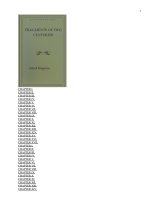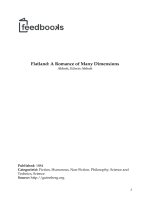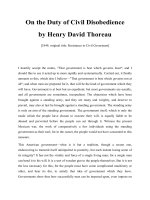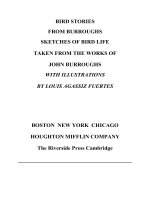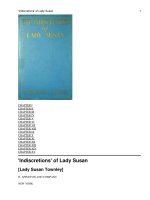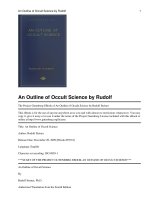Fifty-One Years of Victorian Life potx
Bạn đang xem bản rút gọn của tài liệu. Xem và tải ngay bản đầy đủ của tài liệu tại đây (728.7 KB, 203 trang )
Fifty-One Years of Victorian Life, by
Margaret Elizabeth Leigh Child-Villiers, Countess of Jersey
This eBook is for the use of anyone anywhere at no cost and with almost no restrictions whatsoever. You may
copy it, give it away or re-use it under the terms of the Project Gutenberg License included with this eBook or
online at www.gutenberg.org
Title: Fifty-One Years of Victorian Life
Author: Margaret Elizabeth Leigh Child-Villiers, Countess of Jersey
Release Date: January 14, 2012 [eBook #38569]
Language: English
Character set encoding: ISO-8859-1
***START OF THE PROJECT GUTENBERG EBOOK FIFTY-ONE YEARS OF VICTORIAN LIFE***
E-text prepared by the Online Distributed Proofreading Team () from page images
generously made available by Internet Archive ()
Note: Project Gutenberg also has an HTML version of this file which includes the original illustrations. See
38569-h.htm or 38569-h.zip: ( or
( />Fifty-One Years of Victorian Life, by 1
Images of the original pages are available through Internet Archive. See
/>FIFTY-ONE YEARS OF VICTORIAN LIFE
All Rights Reserved
[Illustration: Margaret Countess of Jersey]
FIFTY-ONE YEARS OF VICTORIAN LIFE
by
THE DOWAGER COUNTESS OF JERSEY
London John Murray, Albemarle Street, W. 1922
DEDICATED TO MY CHILDREN AND GRANDCHILDREN
Printed in Great Britain by Hazell, Watson & Viney, Ld., London and Aylesbury.
"What is this child of man that can conquer Time and that is braver than Love? Even Memory." LORD
DUNSANY.
Though "a Sorrow's Crown of Sorrow" Be "remembering happier things," Present joy will shine the brighter
If our morn a radiance flings.
We perchance may thwart the future If we will not look before, And upon a past which pains us We may
fasten Memory's door.
But we will not, cannot, banish Bygone pleasure from our side, Nor will doubt, beyond the storm-cloud, Shall
be Light at Eventide. M. E. J.
CONTENTS
Fifty-One Years of Victorian Life, by 2
CHAPTER I
AN EARLY VICTORIAN CHILD
The Duke of Wellington Travelling in the Fifties Governesses "Mrs. Gailey" Queen Victoria at
Stoneleigh A narrow escape Life at Stoneleigh Rectors and vicars Theatricals pp. 1-22
CHAPTER I 3
CHAPTER II
A VICTORIAN GIRL
Mentone Genoa Trafalgar veterans Lord Muncaster and Greek brigands The Grosvenor family Uncles
and aunts Confirmation "Coming out" Ireland Killarney The O'Donoghue Myths and legends The
giant Benadadda pp. 23-50
CHAPTER II 4
CHAPTER III
MARRIAGE
Fanny Kemble An old-fashioned Christmas A pre-matrimonial party Fonthill Abbey Engagement
Married to Lord Jersey pp. 51-64
CHAPTER III 5
CHAPTER IV
EARLY MARRIED LIFE
Lord Jersey's mother In London Isola Bella, Cannes Oxfordshire neighbours Caversfield Church Life at
Middleton Mr. Disraeli Froude and Kingsley James Russell Lowell T. Hughes and J. R. Lowell Mr.
Gladstone on Immortality Thought-reading Tom Hughes and Rugby, Tennessee Cardinal Newman pp.
65-93
CHAPTER IV 6
CHAPTER V
BERLIN AND THE JUBILEE OF 1887
Sarah Bernhardt Death of Gilbert Leigh In Italy, 1884 Court Ball in Berlin The Crown Prince
Frederick Prince Bismarck Conversation with Bismarck Bismarck and Lord Salisbury Thanksgiving
Service Trials of Court Officials The Naval Review Knowsley Apotheosis of the Queen pp. 94-121
CHAPTER V 7
CHAPTER VI
GHOST STORIES AND TRAVELS IN GREECE
Lord Halsbury's ghost story The ghostly reporter A Jubilee sermon Marathon Miss
Tricoupi Nauplia The Laurium Mines Hadji Petros Olympia Zante pp. 122-140
CHAPTER VI 8
CHAPTER VII
VOYAGE TO INDIA HYDERABAD
Mr. Joseph Chamberlain Departure for India Colonel Olcott and Professor Max Müller Sir Samuel Baker
Mahableshwar H.H. the Aga Khan Races at Hyderabad H.H. the Nizam of Hyderabad Purdah
ladies Breakfast in a zenana pp. 141-161
CHAPTER VII 9
CHAPTER VIII
MADRAS, CALCUTTA, AND BENARES
Brahmin philosophers Faith of educated Hindus Theosophists at Adyar The Ranees of Travancore The
Princesses of Tanjore "The Heart of Montrose" The Palace of Madura Rous Peter's Sacred Door Loyalty
of native Indians Passengers on the Pundua The Brahmo Somaj Maharajah of Benares Marriages of
infants and widows pp. 162-187
CHAPTER VIII 10
CHAPTER IX
NORTHERN INDIA AND JOURNEY HOME
The Relief of Lucknow View from the Kotab Minar Sekundra and Futtehpore Sekree The legend of
Krishna The Jains The Maharajah of Bhownuggar Baroda English as Lingua Franca Meditations of a
Western wanderer An English plum-pudding The Greek Royal Family Original derivations pp. 188-211
CHAPTER IX 11
CHAPTER X
WINDSOR EGYPT AND SYRIA
Dinner at Windsor Voyage up the Nile Choucry Pasha, Princess Nazli The Pigmies Inn of the Good
Samaritan The Holy City Balbec Damascus, Lady Ellenborough Oriental methods of
trade Smyrna Constantinople The Selamlik The Orient Express Story of a picture pp. 212-239
CHAPTER X 12
CHAPTER XI
FIRST IMPRESSIONS OF AUSTRALIA
War Office red tape Balmoral Farewell to England Voyage on the Arcadia The Federation
Convention The delegates The Blue Mountains Sir Alfred Stephen Domestic
Conditions Correspondence with Lord Derby Labour Legislation The Ex-Kaiser Lord Derby's poem pp.
240-265
CHAPTER XI 13
CHAPTER XII
FURTHER IMPRESSIONS OF AUSTRALIA NEW ZEALAND AND NEW CALEDONIA
Yarrangobilly Caves Dunedin The New Zealand Sounds Hot Springs of New Zealand Huia
Onslow Noumea The Governor of New Caledonia The Convict Settlement Convicts in former
days Death of Lord Ancram pp. 266-286
CHAPTER XII 14
CHAPTER XIII
TONGA AND SAMOA
Tongan ladies Arrival at Apia German plantations R. L. Stevenson King Malietoa The Enchanted
Forest King Mataafa The Kava Ceremony A native dance Missionaries Samoan mythology Desire for
English protection Visit from Tamasese An Object of Pity Courage of R. L. Stevenson pp. 287-318
CHAPTER XIII 15
CHAPTER XIV
DEPARTURE FROM AUSTRALIA CHINA AND JAPAN
Bushrangers Circumstantial evidence The Great Barrier Reef Coloured labour Hong-Kong Canton The
Viceroy of Canton Japanese scenery Interview with the Empress The Sacred Mirror of the Sun
Goddess Christianity in Japan Daimios of old Japan Japanese friends pp. 319-345
CHAPTER XIV 16
CHAPTER XV
JOURNEY HOME THE NILE LORD KITCHENER
The well-forged link of Empire Columbus discovers America The Mayor cuts his hair The pageant
"America" Back at Osterley The dahabyah Herodotus Escape of Slatin Pasha How a King and an Arab
evaded orders The Dervishes Lord Kitchener pp. 346-368
CHAPTER XV 17
CHAPTER XVI
DIAMOND JUBILEE AND DEATH OF QUEEN VICTORIA
Mr. Chamberlain, Colonial Secretary The Queen at Temple Bar The South African War Indian
princesses Lord and Lady Northcote The Victoria League Mr. Chamberlain's letter pp. 369-383
INDEX pp. 385-392
LIST OF ILLUSTRATIONS
MARGARET, COUNTESS OF JERSEY (photogravure) Frontispiece After the portrait by Ellis Roberts at
Osterley Park.
FACING PAGE
STONELEIGH ABBEY 18
THE LIBRARY, MIDDLETON PARK 68 From a photograph by the present Countess of Jersey.
MIDDLETON PARK 68 From a photograph by the present Countess of Jersey.
OSTERLEY PARK 238 From a photograph by W. H. Grove.
GROUP AT MIDDLETON PARK, CHRISTMAS, 1904 370
FIFTY-ONE YEARS OF VICTORIAN LIFE
CHAPTER XVI 18
CHAPTER I
AN EARLY VICTORIAN CHILD
I was born at Stoneleigh Abbey on October 29th, 1849. My father has told me that immediately afterwards I
suppose next day I was held up at the window for the members of the North Warwickshire Hunt to drink my
health. I fear that their kind wishes were so far of no avail that I never became a sportswoman, though I
always lived amongst keen followers of the hounds. For many years the first meet of the season was held at
Stoneleigh, and large hospitality extended to the gentlemen and farmers within the Abbey and to the crowd
without. Almost anyone could get bread and cheese and beer outside for the asking, till at last some limit had
to be placed when it was reported that special trains were being run from Birmingham to a neighbouring town
to enable the populace to attend this sporting carnival at my father's expense. He was a splendid man and a
fearless rider while health and strength permitted rather too fearless at times and among the many applicants
for his bounty were men who based their claims to assistance on the alleged fact that they had picked up Lord
Leigh after a fall out hunting. It was always much more difficult to restrain him from giving than to induce
him to give.
My mother, a daughter of Lord Westminster, told me that from the moment she saw him she had never any
doubt as to whom she would marry. No wonder. He was exceptionally handsome and charming, and I believe
he was as prompt in falling in love with her as she confessed to having been with him. An old relative who
remembered their betrothal told me that she knew what was coming when Mr. Leigh paid £5 for some trifle at
a bazaar where Lady Caroline Grosvenor was selling. The sole reason for recording this is to note that fancy
bazaars were in vogue so long ago as 1848.
My mother was only twenty when she married, and very small and pretty. I have heard that soon after their
arrival at Stoneleigh my father gave great satisfaction to the villagers, who were eagerly watching to see the
bride out walking, by lifting his little wife in his arms and carrying her over a wet place in the road. This was
typical of his unfailing devotion through fifty-seven years of married life a devotion which she returned in
full measure.
I was the eldest child of the young parents, and as my grandfather, Chandos Lord Leigh, was then alive, our
home for a short time was at Adlestrop House in Gloucestershire, which also belonged to the family; but my
grandfather died and we moved to Stoneleigh when I was far too young to remember any other home. In those
days we drove by road from one house to the other, and on one occasion my father undertook to convey my
cradle in his dog-cart, in the space under the back seat usually allotted to dogs. In the middle of a village the
door of this receptacle flew open and the cradle shot out into the road, slightly embarrassing to a very young
man.
About the earliest thing I can recollect was seeing the Crystal Palace Building when in Hyde Park. I do not
suppose that I was taken inside, but I distinctly remember the great glittering glass Palace when I was driving
with my mother. Of course we had pictures of the Great Exhibition and heard plenty about it, but oddly
enough one print that impressed me most was a French caricature which represented an Englishman
distributing the prizes to an expectant throng with words to this effect: "Ladies and Gentlemen, some intrusive
foreigners have come over to compete with our people and have had the impertinence to make some things
better than we do. You will, however, quite understand that none of the prizes will be given to these
outsiders." It was my earliest lesson in doubting the lasting effects of attempts to unite rival countries in any
League of Nations.
[Sidenote: THE DUKE OF WELLINGTON]
Somewhere about this time I had the honour of being presented to the great Duke of Wellington in the long
Gallery (now, alas! no more) at Grosvenor House. I do not remember the incident, but he was the Hero in
CHAPTER I 19
those days, and I was told it so often that I felt as if I could recall it. My father said he kissed me, but my
mother's more modest claim was that he shook hands.
My parents were each endowed with nine brothers and sisters i.e. my father was one of ten who all lived till
past middle life, my mother was one of thirteen of whom ten attained a full complement of years. Indeed,
when my parents celebrated their golden wedding they had sixteen brothers and sisters still alive. As almost
all these uncles and aunts married and most of them had large families, it will be readily believed that we did
not lack cousins, and the long Gallery was a splendid gathering-place for the ramifications of the Grosvenor
side of our family. Apart from the imposing pictures, it was full of treasures, such as a miniature crystal river
which flowed when wound up and had little swans swimming upon it. It was here, later on in my girlhood,
that I saw the first Japanese Embassy to England, stately Daimios or Samurai in full native costume and with
two swords a great joy to all of us children.
To go back to early recollections my next clear impression is of the Crimean War and knitting a pair of red
muffetees for the soldiers. Plenty of "comforts" were sent out even in those days. Sir George Higginson once
told me that when boxes of miscellaneous gifts arrived it was the custom to hold an auction. On one occasion
among the contents were several copies of Boyle's Court Guide and two pairs of ladies' stays! So useful! The
latter were bestowed upon the French vivandière. No W.A.A.C.s then to benefit.
After the Crimean War came the Indian Mutiny, and our toy soldiers represented English and Sepoys instead
of English and Russians. Children in each generation I suppose follow wars by their toys. Despite the
comradeship of English and French in the Crimea, I do not believe that we ever quite ceased to regard France
as the hereditary foe. A contemporary cousin was said to have effaced France from the map of Europe; I do
not think we were quite so daring.
In all, I rejoiced in five brothers and two sisters, but the fifth brother died at fourteen months old before our
youngest sister was born. His death was our first real sorrow and a very keen one. Long before that, however,
when we were only three children, Gilbert, the brother next to me, a baby sister Agnes, and myself, our
adventurous parents took us to the South of France. I was four years old at the time and the existence of a
foreign land was quite a new light to me. I well remember running into the nursery and triumphantly
exclaiming, "There is a country called France and I am going there!"
[Sidenote: TRAVELLING IN THE FIFTIES]
My further recollections are vague until we reached Lyons, where the railway ended and our large travelling
carriage brought from England was put on a boat steamer, I suppose and thus conveyed to Avignon. Thence
we drove, sleeping at various towns, until we reached Mentone, where we spent some time, and I
subsequently learnt that we were then the only English in the place. I think that my parents were very brave to
take about such young children, but I suppose the experiment answered pretty well, as a year later they again
took Gilbert and me to France this time to Normandy, where I spent my sixth birthday, saw the great horses
dragging bales of cotton along the quays at Rouen, and was enchanted with the ivory toys at Dieppe.
I think that people who could afford it travelled more in former days than is realised. Both my grandparents
made prolonged tours with most of their elder children. My grandfather Westminster took my mother and her
elder sisters in his yacht to Constantinople and Rome. My mother well remembered some of her experiences,
including purchases from a Turkish shopkeeper who kept a large cat on his counter and served various
comestibles with his hands, wiping them between each sale on the animal's fur. At Rome she told me how she
and one of her sisters, girls of some twelve and thirteen years old, used to wander out alone into the
Campagna in the early morning, which seems very strange in view of the stories of restraint placed upon
children in bygone days. As to my grandfather Leigh, I believe he travelled with his family for about two
years, to Switzerland, France and the North of Italy. They had three carriages, one for the parents, one for the
schoolroom, and one for the nursery. A courier escorted them, and an avant-courier rode on in front with bags
CHAPTER I 20
of five-franc pieces to secure lodgings when they migrated from one place to another. On one occasion on the
Riviera they met the then Grand Duke Constantine, who thrust his head out of the window and exclaimed
"Toute Angleterre est en route!"
[Sidenote: GOVERNESSES]
After our return from Normandy we were placed in charge of a resident governess, a young German, but as
far as I can recollect she had very little control over us. We discovered that the unlucky girl, though of
German parentage, had been born in Russia, and with the unconscious cruelty of children taunted her on this
account. Anyhow her stay was short, and she was succeeded about a year later by an Englishwoman, Miss
Custarde, who kept us in very good order and stayed till she married when I was fourteen. Her educational
efforts were supplemented by masters and mistresses during the London season and by French resident
governesses in the winter months, but I do not think that we were at all overworked.
I doubt whether Miss Custarde would have been considered highly educated according to modern standards,
but she was very good in teaching us to look up information for ourselves, which was just as useful as
anything else. Her strongest point was music, but that she could not drive into me, and my music lessons were
a real penance to teacher and pupil alike. She would give me lectures during their progress on such topics as
the Parable of the Talents quite ignoring the elementary fact that though I could learn most of my lessons
quickly enough I had absolutely no talent for music. She was, however, a remarkable woman with great
influence, not only over myself, but over my younger aunts and over other men and women. She was very
orderly, and proud of that quality, but she worked too much on my conscience, making me regard trivial faults
as actual sins which prevented her from kissing me or showing me affection an ostracism which generally
resulted in violent fits of penitence. She had more than one admirer before she ended by marrying a
schoolmaster, with whom she used to take long walks in the holidays. One peculiarity was that she would give
me sketches of admirers and get me to write long stories embodying their imaginary adventures. I suppose
these were shown as great jokes to the heroes and their friends. Of course she did not think I knew the
"inwardness" of her various friendships, equally of course as time went on I understood them perfectly. Miss
Custarde is not the only governess I have known who acquired extraordinary influence over her pupils. In
Marcel Prevost's novel Anges Gardiens, which represents the dangers to French families of engaging foreign
governesses, he makes the Belgian, Italian, and German women all to a greater or less extent immoral, but the
Englishwoman, though at least as detestable as the others, is not immoral; the great evil which she inflicts on
the family which engages her is the absolute power which she acquires over her pupil. The whole book is very
unfair and M. Prevost seems to overlook the slur which he casts on his own countrymen, as none of the men
appear able to resist the wiles of the sirens engaged to look after the girls of their families; but it is odd that he
should realise the danger of undue influence and attribute it only to the Englishwoman. Why should this be a
characteristic of English governesses supposing his experience (borne out by my own) to be typical? Is it an
Englishwoman's love of power and faculty for concentration on the object which she wishes to attain?
We liked several of our foreign governesses well enough, but they exercised no particular influence and as a
rule their engagements were only temporary. I do not think that Miss Custarde gave them much opportunity of
ascendancy. With one her relations were so strained that the two ladies had their suppers at different tables in
the schoolroom, and when the Frenchwoman wanted the salt she rang the bell for the schoolroom-maid to
bring it from her English colleague's table. However, I owed a great deal to Miss Custarde and know that her
affection for all of us was very real. She died in the autumn of 1920, having retained all her faculties till an
advanced age.
After all no human being could compete with our mother in the estimation of any of her children. Small and
fragile and often suffering from ill-health, she had almost unbounded power over everyone with whom she
came in contact, and for her to express an opinion on any point created an axiom from which there was no
appeal. As middle-aged men and women we have often laughed over the way in which we have still accepted
"mama said" so-and-so as a final verdict. As children our faith not only in her wisdom but in her ability was
CHAPTER I 21
unlimited. I remember being regarded as almost a heretic by the younger ones because I ventured to doubt
whether she could make a watch. Vainly did I hedge by asserting that I was certain that if she had learnt she
could make the most beautiful watch in the world I had infringed the first article of family faith by thinking
that there was anything which she could not do by the uninstructed light of nature. She was a good musician,
and a really excellent amateur artist her water-colour drawings charming. Her knowledge of history made it
delightful to read aloud to her, as she seemed as if the heroes and heroines of bygone times had been her
personal acquaintance. Needless to say her personal care for everyone on my father's property was untiring,
and the standard of the schools in the various villages was maintained at a height uncommon in days when
Education Acts were not so frequent and exacting as in later years.
[Sidenote: "MRS. GAILEY"]
Another great character in our home was our old nurse. For some reason she was never called Nanna, but
always "Mrs. Gailey." The daughter of a small tradesman, she was a woman of some education she had even
learnt a little French and had been a considerable reader. Though a disciple of Spurgeon, she had lived as
nurse with my mother's cousin the Duke of Norfolk in the days when the girls of the family were Protestants
though the boys were Roman Catholics. When the Duchess (daughter of Lord Lyons) went over to the Roman
Church the Protestant nurse's position became untenable, as the daughters had to follow their mother. She told
us that this was a great distress at first to the eldest girl Victoria (afterwards Hope-Scott), for at twelve years
old she was able to feel the uprooting of her previous faith. The other sisters were too young to mind. Gailey's
idol, however, was Lord Maltravers (the late Duke), who must have been as attractive a boy as he became
delightful a man.
Gailey came to us when I was about four, my first nurse, who had been my wet-nurse, having married the
coachman. Our first encounter took place when I was already in my cot, and I announced to her that if she
stayed a hundred years I should not love her as I had done "Brownie." "And if I stay a hundred years," was the
repartee, "I shall not love you as I did the little boy I have just left" so we started fair. Nevertheless she was
an excellent nurse and a fascinating companion. She could tell stories by the hour and knew all sorts of
old-fashioned games which we played in the nursery on holiday afternoons.
The great joy of the schoolroom children was to join the little ones after tea and to sit in a circle while she told
us either old fairy tales, or more frequently her own versions of novels which she had read and of which she
changed the names and condensed the incidents in a most ingenious manner. On Sunday evenings Pilgrim's
Progress in her own words was substituted for the novels. Miss Custarde could inflict no greater punishment
for failure in our "saying lessons" than to keep us out of the nursery. Gailey stayed with us till some time after
my marriage and then retired on a pension.
The Scottish housekeeper, Mrs. Wallace, was also a devoted friend and a great dispenser of cakes, ices, and
home-made cowslip and ginger wine. Rose-water, elder-flower water, and all stillroom mysteries found an
expert in her, and she even concocted mead from an old recipe. Few people can have made mead in this
generation it was like very strong rather sweet beer. We all loved "Walley" but she failed us on one
occasion. Someone said that she had had an uncle who had fought at Waterloo, so we rushed to her room to
question her on this hero's prowess. "What did your uncle do at Waterloo?" The reply was cautious and rather
chilling: "I believe he hid behind his horse." She looked after all our dogs and was supposed to sleep with
eight animals and birds in her room.
[Sidenote: QUEEN VICTORIA AT STONELEIGH]
In the summer of 1858 a great event occurred in the annals of Stoneleigh. Queen Victoria stayed at my father's
for two nights in order to open Aston Hall and Park, an old Manor House and property, which had belonged to
the Bracebridge family and had been secured for the recreation of the people of Birmingham. Naturally there
was great excitement at the prospect. For months beforehand workmen were employed in the renovation and
CHAPTER I 22
redecoration of the Abbey and its precincts. Many years afterwards an ex-coachpainter met one of my sons
and recalled to him the glorious days of preparation for Her Majesty's visit. "Even the pigsties were painted,
sir," said he.
Stoneleigh is a large mass of buildings parts of the basement remain from the original Abbey of the
Cistercian monks. On these was built a picturesque house about the beginning of the seventeenth century,
early in the eighteenth century a large mansion was added in the classical Italian style, and about a hundred
years later a new wing was erected to unite the two portions. The old Abbey Church stood in what is now a
lawn between the house and the ancient Gateway, which bears the arms of Henry II. To put everything in
order was no light task. The rooms for the Queen and Prince Consort were enclosed on one side of the
corridor leading to them by a temporary wall, and curtained off where the corridor led to the main staircase. In
addition to every other preparation, the outline of the gateway, the main front of the house, and some of the
ornamental flower-beds were traced out with little lamps I think there were 22,000 which were lighted at
night with truly fairy-like effect. By that time we were five children the house was crowded in every nook
and corner with guests, servants, and attendants of all kinds. Somehow my brother Gilbert and I were stowed
away in a room with two or three maids, but the "little ones," Agnes and two small brothers Dudley and
Rupert, were sent to the keeper's house in the Deerpark. That house was a delightful old-world building
standing on a hill with a lovely view, and we were occasionally sent there for a day or two's change of air, to
our great joy.
On the occasion of the Royal Visit, however, Gilbert and I quite realised our privilege in being kept in the
Abbey and allowed to stand with our mother and other members of the family to welcome the Queen as the
carriage clattered up with its escort of Yeomanry. My father had, of course, met Her Majesty at the station.
The Queen was more than gracious and at once won the hearts of the children but we did not equally
appreciate the Prince Consort. Assuredly he was excellent, but he was very stiff and reserved, and I suppose
that we were accustomed to attentions from our father's guests which he did not think fit to bestow upon us,
though the Queen gave them in ample measure.
We were allowed to join the large party of guests after dinner, and either the first or the second evening
witnessed with interest and amusement the presentation of the country neighbours to the Queen. Having been
carefully instructed as to our own bows and curtsies, we naturally became very critical of the "grown-up"
salutations, particularly when one nervous lady on passing the royal presence tossed her head back into the air
by way of reverence. I think the same night my father escorted the Queen into the garden in front of the house,
which was separated from part of the Park by a stone balustrade. In this park-ground several thousand people
had assembled who spontaneously broke into "God save the Queen" when she appeared. Fortunately the
glorious hot summer night (July) was ideal for the greeting.
One morning our small sister and brothers were brought to the Abbey "to be presented." Agnes made a neat
little curtsy, though we unkindly asserted that it was behind the Queen's back, but the baby boys were
overcome by shyness and turned away from the Queen's kisses. Unfortunate children! they were never
allowed to forget this!
[Sidenote: THE PRINCE CONSORT]
Poor Prince Consort lost his last chance of good feeling from Gilbert and myself when he and the Queen went
to plant memorial trees. We rushed forward to be in time to see the performance, but he sternly swept us from
the royal path. No doubt he was justified in bidding us "stand back," but he might have remembered that we
were children, and his host's children, and done it more gently.
I shall refer to our dear Queen later on, but may here insert a little incident of her childhood which came to my
knowledge accidentally. In the village belonging to my married home, Middleton Stoney, there was a
middle-aged policeman's wife who cultivated long ringlets on either side of her face. She once confided to me
CHAPTER I 23
that as a child she had had beautiful curls, and that, living near Kensington Palace, they had on one occasion
been cut off to make "riding curls" for Princess (afterwards Queen) Victoria, who had lost her own
hair temporarily from an illness. The child had not liked this at all, though she had been given some of the
Princess's hair as an equivalent. I imagine that her parents received more substantial payment.
Our childhood was varied by a good deal of migration. We were regularly taken each year about May to our
father's London house, 37 Portman Square, where we entertained our various cousins at tea-parties and visited
them in return. We were generally taken in the autumn to some seaside place such as Brighton, Hastings,
Rhyl, or the Isle of Wight. We estimated the merits of each resort largely according to the amount of sand
which it afforded us to dig in, and I think Shanklin in the Isle of Wight took the foremost place in our
affections.
[Sidenote: A NARROW ESCAPE]
Two years, however, had specially delightful autumns, for in each of these our father took a moor in
Scotland once Kingairloch and the second time Strontian. On each occasion I accompanied my parents; to
Kingairloch, Gilbert (Gilly he was always called) came also the second year he spent half the time with us
and then returned to his tutor and Agnes, and Dudley took his place for the remainder of our stay. How we
enjoyed the fishing, bathing in the loch, and paddling in the burns! Everyone who has spent the shooting
season in Scotland knows all about it, and our experiences, though absolutely delightful, did not differ much
from other people's. These visits were about 1860 and 1861. The railroad did not extend nearly so far as at
present and the big travelling-carriage again came into play. One day it had with considerable risk to be
conveyed over four ferries and ultimately to be driven along a mountainous road after dark. As far as I
remember we had postilions certainly the charioteer or charioteers had had as much whisky as was good for
them, with the result that the back wheels of the heavy carriage went right over the edge of a precipice. The
servants seated behind the carriage gave themselves over for lost we children were half-asleep inside and
unconscious of our peril, when the horses made a desperate bound forward and dragged the carriage back on
to the road. We were taken later to see the place with the marks of the wheels still plain on the rocky
edge and young as we were could quite realise what we had escaped. Both shooting lodges were situated in
the midst of the lovely mountain scenery of North Argyllshire, possibly Kingairloch was the more beautiful of
the two. One day from dawn to eve the mountains echoed and re-echoed with the plaintive bleating of flocks,
and we were told that it was because the lambs were taken from their mothers. I still possess some verses
which my mother wrote on that occasion, and transcribe them to show that she had a strong poetic as well as
artistic vein:
"Far over the mountains and over the corries Echoed loud wailings and bleatings the day When from the side
of the mothers that loved them The lambs at Kingairloch were taken away.
"Vainly, poor mothers, ye watch in the valley The nook where your little ones gambolled before, Vainly ye
climb to the heights of the mountains They answer you not, and shall answer no more!
"Never again from that stream-silvered hill-side, Seeking fresh grass betwixt harebell and heather, Shall you
and your lambkins look back on Loch Corry, Watching the flight of the sea-bird together.
"No more, when the storm, striking chords on the mountains, Drives down the thick mists their tall summits to
hide, Shall you give the sweet gift of a mother's protection To the soft little creatures crouched down by your
side.
"Past the sweet peril! and gone the sweet pleasure! Well might the echoes tell sadly that day The plaint of
the mothers that cried at Kingairloch The day that the lambs were taken away."
Visits to Scotland included sojourns at Ardgowan, the home of our uncle and aunt Sir Michael and Lady
CHAPTER I 24
Octavia Shaw-Stewart on the Clyde. Aunt Occy, as we called her, was probably my mother's favourite
sister in any case her children were our favourite cousins on the Grosvenor side, and we loved our many
visits to Ardgowan both when we went to the moors and in after years. There were excursions on the hills and
bathing in the salt-water of the Clyde, fishing from boats, and shells to be collected on the beach. Also my
uncle had a beautiful yacht in which he took us expeditions towards Arran and to Loch Long from which we
were able to go across the mountain pass to Loch Lomond.
My grandmother Lady Leigh died in 1860, before which time she used to pay lengthened visits to Stoneleigh
accompanied by three or four unmarried daughters. She was a fine handsome old lady. Her hair had turned
white when she was about thirty-two, but, as old ladies did in those days, she wore a brown front with a black
velvet band. She had a masterful temper and held her daughters in considerable awe, but, after the manner of
grandparents, was very kind to us. I fancy that so many unmarried sisters-in-law may have been a slight trial
to my mother, but we regarded our aunts as additional playfellows bound to provide us with some kind of
amusement. The favourite was certainly "Aunt Georgy," the youngest daughter but one. She had an unfailing
flow of spirits, could tell stories and join in games, and never objected to our invasion of her room at any
time. Poor "Aunt Gussie" (Augusta) was less fortunate: she had bad health and would scold us to make us
affectionate an unsuccessful method to say the least of it the natural result was, I fear, that we teased her
whenever opportunity offered. Aunt Georgie was very good-looking and I believe much admired. She did not,
however, marry till she was about forty. A Colonel Newdigate, whose runaway horse she had stopped when
quite a girl, had fallen in love with her and wanted to marry her. She persistently refused and he married
someone else. When his wife died, he returned to his first affection and ultimately melted my Aunt's heart.
She had no children of her own, but was a good stepmother to his only son now Sir Frank Newdegate,
Governor of West Australia.
[Sidenote: LIFE AT STONELEIGH]
Stoneleigh offered every possible amusement to children long galleries and passages to race up and down, a
large hall for battledore and shuttlecock and other games, parks and lawns for riding and cricket, and the River
Avon at the bottom of the garden for fishing and boating, not to mention skating in hard winters. People are
apt to talk and write as if "Early Victorian" and "Mid-Victorian" children were kept under strict control and
made to treat their elders with respectful awe. I cannot recall any undue restraint in our case. As I have already
said, our mother was an influence which no one would have attempted to resist, but she never interfered with
any reasonable happiness or amusement. Our father was the most cheerful of companions, loving to take us
about to any kind of sights or entertainments which offered, and buying us toys and presents on every possible
occasion. The only constraint put upon us, which is not often used with the modern child, concerned religious
observance. We had to come in to daily Prayers at 10 o'clock even if it interfered with working in our gardens
or other out-door amusement and church twice on Sundays was the invariable rule as soon as we were old
enough to walk to the neighbouring villages of Stoneleigh and Ashow, or to attend the ministrations of the
chaplain who generally officiated once each Sunday in the chapel in the house. We had to learn some
"Scripture lesson" every day and two or three on Sundays, and I being the eldest had not only to repeat these
Sunday lessons to my mother, but also to see in a general way that my younger brothers and sisters knew
theirs. I was made to learn any number of chapters and hymns, and Scripture catechisms not to speak of the
Thirty-nine Articles! At last when mother and governess failed to find something more to learn by heart I was
told to commit portions of Thomas à Kempis to memory. Here, I grieve to confess, I struck that is to say, I
did not venture actually to refuse, but I repeated the good brother's words in such a disagreeable and
discontented tone of voice that no one could stand it, and the attempt to improve me in this way was tacitly
abandoned.
[Illustration: STONELEIGH ABBEY.]
[Sidenote: RECTORS AND VICARS]
CHAPTER I 25

